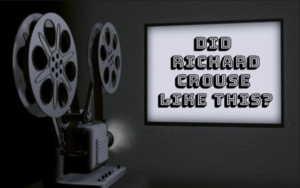Posts Tagged ‘Ben Affleck’
Listen to the whole thing HERE
Tags: Aaron Horvath , Air , Air Jordan shoeline , Air: Courting a Legend , Alex Convery , and Viola Davis , Anya Taylor-Joy , Aubrey Plaza , Ben Affleck , biographical sports drama , Bugzy Malone , Cary Elwes , Charles Martinet , Charlie Day , Chris Messina , Chris Pratt , Chris Tucker , computer-animated fantasy , Fred Armisen , Guy Ritchie , Hugh Grant , Inc , Ivan Atkinson , Jack Black , Jason Bateman , Jason Statham , Josh Hartnett , Keegan-Michael Key , Kevin Michael Richardson , Marlon Wayans , Marn Davies , Matt Damon , Matthew Fogel , Michael Jelenic , Michael Jordan , Nike , Nintendo's Mario , Operation Fortune: Ruse de Guerre , Sebastian Maniscalco , Seth Rogen , spy action comedy , The Super Mario Bros. Movie NewsTalk 1010 | Comments Off on NEWSTALK TONIGHT WITH JIM RICHARDS: DOES RICHARD CROUSE LIKE THESE MOVIES?
Thursday, April 6th, 2023
Watch the whole thing HERE ! (Starts at )
Tags: Air , Air Jordan shoeline , Air: Courting a Legend , Alex Convery , and Viola Davis , Aubrey Plaza , Ben Affleck , biographical sports drama , Bugzy Malone , Cary Elwes , Chris Messina , Chris Tucker , Guy Ritchie , Hugh Grant , Inc , Ivan Atkinson , Jason Bateman , Jason Statham , Josh Hartnett , Marlon Wayans , Marn Davies , Matt Damon , Michael Jordan , Nike , Operation Fortune: Ruse de Guerre , spy action comedy Richard Sez | Comments Off on CTV NEWS AT SIX: NEW MOVIES AND TV SHOWS TO CHECK OUT THIS WEEKEND!
Thursday, April 6th, 2023
Watch the whole thing HERE
Tags: Aaron Horvath , Air , Air Jordan shoeline , Air: Courting a Legend , Alex Convery , and Viola Davis , Anya Taylor-Joy , Aubrey Plaza , Ben Affleck , biographical sports drama , Bugzy Malone , Cary Elwes , Charles Martinet , Charlie Day , Chris Messina , Chris Pratt , Chris Tucker , computer-animated fantasy , Fred Armisen , Guy Ritchie , Hugh Grant , Inc , Ivan Atkinson , Jack Black , Jason Bateman , Jason Statham , Josh Hartnett , Keegan-Michael Key , Kevin Michael Richardson , Marlon Wayans , Marn Davies , Matt Damon , Matthew Fogel , Michael Jelenic , Michael Jordan , Nike , Nintendo's Mario , Operation Fortune: Ruse de Guerre , Sebastian Maniscalco , Seth Rogen , spy action comedy , The Super Mario Bros. Movie Film Review | Comments Off on RICHARD’S WEEKEND MOVIE REVIEWS FROM CP24! FRIDAY APRIL 06, 2023.
Thursday, April 6th, 2023
Watch the whole thing HERE
Tags: Aaron Horvath , Air , Air Jordan shoeline , Air: Courting a Legend , Alex Convery , and Viola Davis , Anya Taylor-Joy , Aubrey Plaza , Ben Affleck , biographical sports drama , Bugzy Malone , Cary Elwes , Charles Martinet , Charlie Day , Chris Messina , Chris Pratt , Chris Tucker , computer-animated fantasy , Fred Armisen , Guy Ritchie , Hugh Grant , Inc , Ivan Atkinson , Jack Black , Jason Bateman , Jason Statham , Josh Hartnett , Keegan-Michael Key , Kevin Michael Richardson , Marlon Wayans , Marn Davies , Matt Damon , Matthew Fogel , Michael Jelenic , Michael Jordan , Nike , Nintendo's Mario , Operation Fortune: Ruse de Guerre , Sebastian Maniscalco , Seth Rogen , spy action comedy , The Super Mario Bros. Movie Film Review | Comments Off on RICHARD’S CTV NEWSCHANNEL REVIEWS FOR MAR 31 WITH MARCIA MACMILLAN.
Thursday, April 6th, 2023
Listen to the whole thing HERE
Tags: Aaron Horvath , Air , Air Jordan shoeline , Air: Courting a Legend , Alex Convery , and Viola Davis , Anya Taylor-Joy , Aubrey Plaza , Ben Affleck , biographical sports drama , Bugzy Malone , Cary Elwes , Charles Martinet , Charlie Day , Chris Messina , Chris Pratt , Chris Tucker , computer-animated fantasy , Fred Armisen , Guy Ritchie , Hugh Grant , Inc , Ivan Atkinson , Jack Black , Jason Bateman , Jason Statham , Josh Hartnett , Keegan-Michael Key , Kevin Michael Richardson , Marlon Wayans , Marn Davies , Matt Damon , Matthew Fogel , Michael Jelenic , Michael Jordan , Nike , Nintendo's Mario , Operation Fortune: Ruse de Guerre , Sebastian Maniscalco , Seth Rogen , spy action comedy , The Super Mario Bros. Movie Film Review | Comments Off on 1290 CJBK IN LONDON: KEN & MARINA MORNING SHOW MOVIE REVIEWS!
Thursday, April 6th, 2023
Watch the whole thing HERE
Tags: Aaron Horvath , Air , Air Jordan shoeline , Air: Courting a Legend , Alex Convery , Ali Wong , and Viola Davis , Anya Taylor-Joy , Beef , Ben Affleck , biographical sports drama , Charles Martinet , Charlie Day , Chris Messina , Chris Pratt , Chris Tucker , computer-animated fantasy , Fred Armisen , Inc , Jack Black , Jason Bateman , Keegan-Michael Key , Kevin Michael Richardson , Marlon Wayans , Matt Damon , Matthew Fogel , Michael Jelenic , Michael Jordan , Nike , Nintendo's Mario , Sebastian Maniscalco , Seth Rogen , Steven Yeun , The Super Mario Bros. Movie CP24 , Film Review | Comments Off on CP24 BREAKFAST: WHAT TO WATCH IN THEATRES AND ON STREAMING THIS WEEKEND!
Thursday, April 6th, 2023
Listen to the whole thing HERE
Tags: Aaron Horvath , Air , Air Jordan shoeline , Air: Courting a Legend , Alex Convery , and Viola Davis , Anya Taylor-Joy , Aubrey Plaza , Ben Affleck , biographical sports drama , Bugzy Malone , Cary Elwes , Charles Martinet , Charlie Day , Chris Messina , Chris Pratt , Chris Tucker , computer-animated fantasy , Fred Armisen , Guy Ritchie , Hugh Grant , Inc , Ivan Atkinson , Jack Black , Jason Bateman , Jason Statham , Josh Hartnett , Keegan-Michael Key , Kevin Michael Richardson , Marlon Wayans , Marn Davies , Matt Damon , Matthew Fogel , Michael Jelenic , Michael Jordan , Nike , Nintendo's Mario , Operation Fortune: Ruse de Guerre , Sebastian Maniscalco , Seth Rogen , spy action comedy , The Super Mario Bros. Movie Film Review | Comments Off on CKTB NIAGARA REGION: THE TIM DENIS SHOW WITH RICHARD CROUSE ON MOVIES!
Thursday, April 6th, 2023
Listen to the whole thing HERE
Tags: Aaron Horvath , Air , Air Jordan shoeline , Air: Courting a Legend , Alex Convery , and Viola Davis , Anya Taylor-Joy , Aubrey Plaza , Ben Affleck , biographical sports drama , Bugzy Malone , Cary Elwes , Charles Martinet , Charlie Day , Chris Messina , Chris Pratt , Chris Tucker , computer-animated fantasy , Fred Armisen , Guy Ritchie , Hugh Grant , Inc , Ivan Atkinson , Jack Black , Jason Bateman , Jason Statham , Josh Hartnett , Keegan-Michael Key , Kevin Michael Richardson , Marlon Wayans , Marn Davies , Matt Damon , Matthew Fogel , Michael Jelenic , Michael Jordan , Nike , Nintendo's Mario , Operation Fortune: Ruse de Guerre , Sebastian Maniscalco , Seth Rogen , spy action comedy , The Super Mario Bros. Movie Film Review | Comments Off on CFRA IN OTTAWA: THE BILL CARROLL MORNING SHOW MOVIE REVIEWS!
Wednesday, April 5th, 2023
Watch the whole thing HERE
Tags: Aaron Horvath , Air , Air Jordan shoeline , Air: Courting a Legend , Alex Convery , and Viola Davis , Anya Taylor-Joy , Aubrey Plaza , Ben Affleck , biographical sports drama , Bugzy Malone , Cary Elwes , Charles Martinet , Charlie Day , Chris Messina , Chris Pratt , Chris Tucker , computer-animated fantasy , Fred Armisen , Guy Ritchie , Hugh Grant , Inc , Ivan Atkinson , Jack Black , Jason Bateman , Jason Statham , Josh Hartnett , Keegan-Michael Key , Kevin Michael Richardson , Marlon Wayans , Marn Davies , Matt Damon , Matthew Fogel , Michael Jelenic , Michael Jordan , Nike , Nintendo's Mario , Operation Fortune: Ruse de Guerre , Sebastian Maniscalco , Seth Rogen , spy action comedy , The Super Mario Bros. Movie Film Review | Comments Off on YOU TUBE: THREE MOVIES/THIRTY SECONDS! FAST REVIEWS FOR BUSY PEOPLE!
 I join NewsTalk 1010 host Jim Richards on the coast-to-coast-to-coast late night “NewsTalk Tonight” to play the game “Did Richard Crouse Like This?” This week we talk about the video game flick “The Super Mario Bros. Movie,” the story of the world’s most famous sneaker “Air” and the action of “Operation Fortune.”
I join NewsTalk 1010 host Jim Richards on the coast-to-coast-to-coast late night “NewsTalk Tonight” to play the game “Did Richard Crouse Like This?” This week we talk about the video game flick “The Super Mario Bros. Movie,” the story of the world’s most famous sneaker “Air” and the action of “Operation Fortune.”







